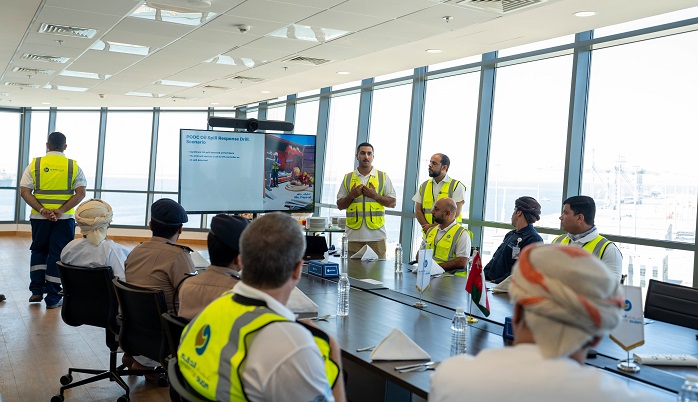
Muscat: The Port of Duqm organised an extensive Oil Spill Response training programme for all relevant stakeholders and an Oil Spill Mock Drill, in the presence of Dr Ali Al Sunaidi, Chairman of the Public Authority for Special Economic Zones and Free Zones at Duqm. This initiative reflects the port's commitment to sustainability, environmental responsibility and collaboration with stakeholders.
The Oil Pollution Preparedness, Response, and Cooperation (OPRC) training objectives include developing multiple scenarios, and corresponding strategies, identifying challenges in the implementation of plans and deploying oil spill response equipment (OSRE) during emergencies. The training also addressed various stakeholders' Oil spill response plans and the importance of collaborative efforts in effectively responding to minimise the environmental Impact.
The drill was efficiently concluded professionally by coordinating efforts across various teams within the Port of Duqm and stakeholders like Sezad, OTTCO, Asyad Drydock, ATD, CTOM, ACT& LAMOR. The exercise also acts as a test for the reliability of oil spill response equipment like containment booms, deflection booms, skimmers and accessories.
The port's spill response team demonstrated high efficiency in handling spill incidents, highlighting the readiness of employees and equipment for such situations. The equipment used in the drill included various pollution barriers designed to protect sensitive areas, oil extraction equipment from seawater, oil-water separation units, and secure oil storage equipment to prevent pollution. The response time for deploying the equipment and activating the required teams adhered to the best global practices.
In response to the training and drill, Eng. Hashem Bin Tahir Al Ibrahim, the chief business support officer at the Port of Duqm, stated, "The crisis management and oil spill response training aim to support the port's development efforts and enhance its efficiency, thus maximizing the port's potential and strengthening its competitiveness among regional ports. The simulated training ensures the implementation of potential scenarios for dealing with oil pollution incidents, utilizing the latest pollution control techniques."
He added, "This training reflects the Port of Duqm's commitment to maintaining the highest levels of emergency response readiness, ensuring the safety of our operations alongside protecting the surrounding environment."
Al Ibrahim also praised the cooperation and coordination among the participating entities in the training within the oil spill response plan, emphasising the port's commitment to environmental standards and taking all necessary security and safety precautions in line with sustainable development goals in Oman's development strategies and plans. This was achieved through a comprehensive evaluation session to review the results and lessons learned which will contribute to improving the port's readiness to face any future challenges.
It is worth noting that the Port of Duqm continuously updates its practices to prepare for unforeseen events, ensuring business continuity, enhancing competitiveness, and protecting biodiversity. This underscores the port's capacity to manage crises and respond to oil spill incidents in coordination and full cooperation with relevant authorities to support the port's development efforts.